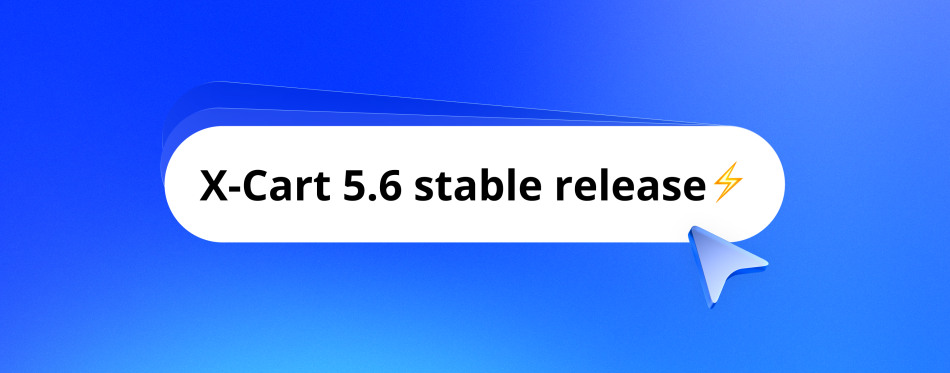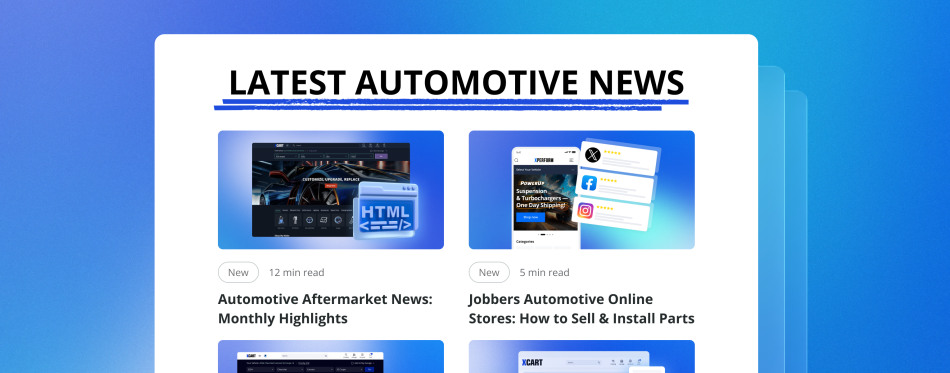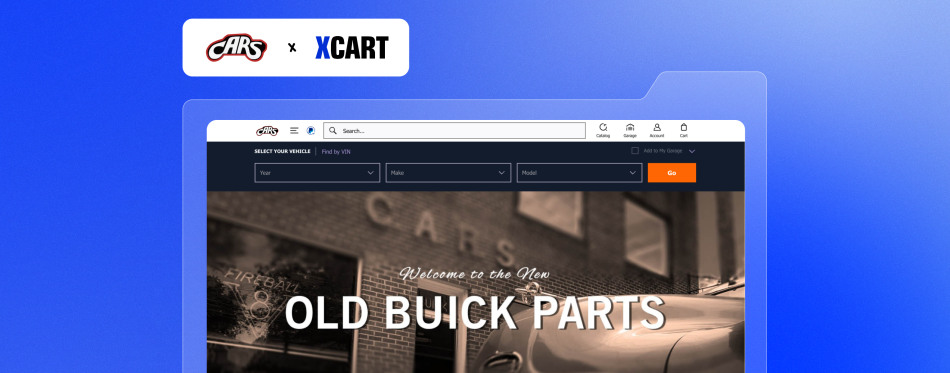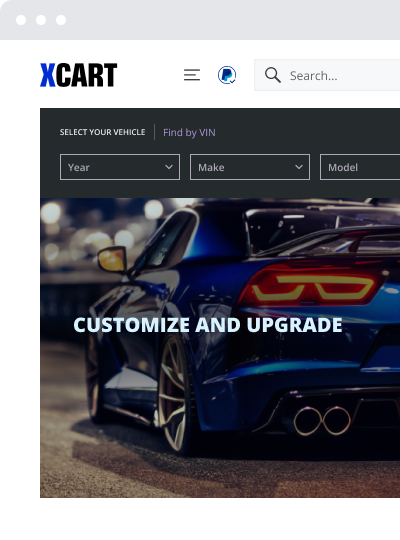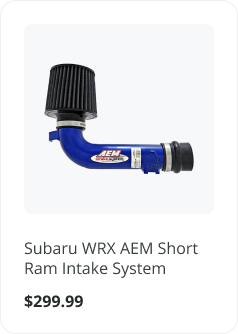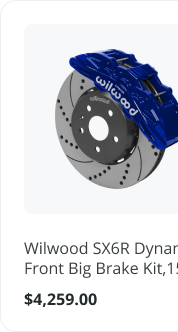eCommerce Replatforming for Your Auto Parts Store: 7 Steps for a Smooth Transition
For auto parts retailers, your eCommerce platform is more than a checkout page — it’s the engine of your entire operation. It has to handle millions of SKUs, complex fitment data, and demanding customer searches. If your current platform is sputtering, stalling, or holding your business back, it may be time to replatform.
These seven key strategies will help you ensure your transition to a new platform is a success.
What is an eCommerce Platform for Online Stores?
An eCommerce platform is the software backbone that helps online store owners manage their businesses. eCommerce platforms come in at least four different flavors, and many businesses opt for a software-as-a-service (SaaS) solution. This way, they can manage orders and inventory, accounting, merchandising, marketing, financials, and customer service within a single managed system.
SaaS eCommerce platforms fill the role formerly served by on-premise eCommerce software, which often requires extensive setup and management efforts. In the SaaS model, the provider handles all software management and upgrades, and some offer ongoing technical support and advice as well.
For the auto parts industry, a high-performance SaaS platform is critical for handling massive catalogs, year-make-model-engine fitment data, and the specific search behaviors of mechanics and DIY enthusiasts. That’s why many are questioning their current solutions, especially those not built for the automotive industry first.
Why Auto Parts Stores Switch to a New eCommerce Platform
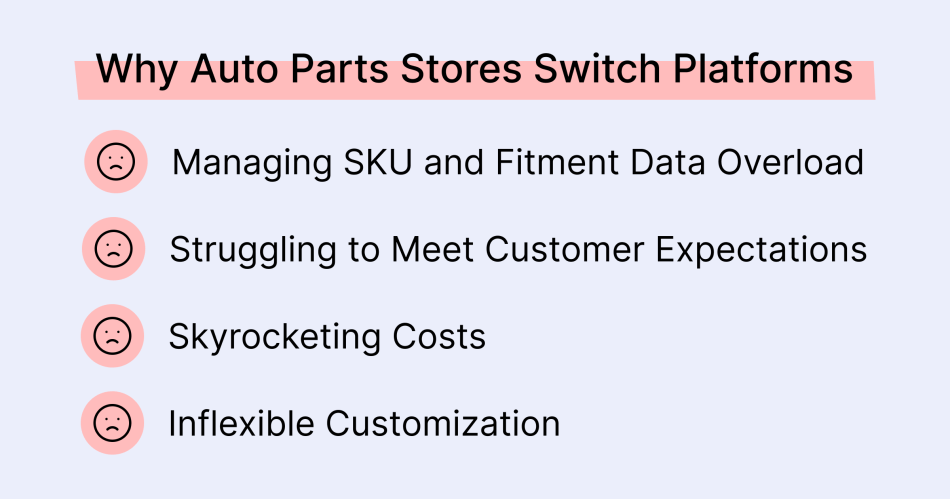
Choosing an initial eCommerce platform is a challenge because it’s hard to anticipate the sheer scale and complexity of an auto parts business. Although it’s always best to start out with a platform that can grow with you, many auto parts businesses find themselves needing a new platform for these key reasons.
Managing SKU and Fitment Data Overload
When your inventory grows to millions of SKUs, you will outgrow a standard platform’s capability. The automotive parts industry is defined by this challenge, requiring platforms that can not only handle the SKU count but also manage complex fitment data (year, make, model, engine), part interchanges, and product variations.
Struggling to Meet Customer Expectations
If your platform can’t support a fast, intuitive year-make-model lookup tool or VIN search, you are actively losing customers. Mechanics and DIYers demand accuracy and speed; if they can’t confirm a part fits their vehicle in seconds, they will go to a competitor.
Skyrocketing Costs
Many businesses face a formidable jump in monthly costs to upgrade features on their current platform. For parts sellers, this price hike is triggered by crossing a SKU threshold or needing a more robust database (a near certainty in this industry).
Inflexible Customization
Generic platforms don’t allow for the deep customizations auto parts stores need. This forces you to use clunky workarounds for fitment data, part diagrams, or integrations with supplier feeds, instead of having a seamless and purpose-built solution.
When the decision to initiate eCommerce replatforming is made, there will be a set of challenges to overcome before you can start operating on a new platform.
The Unique Challenges of the Auto Parts eCommerce Replatforming Process
Even with strong motivation, eCommerce replatforming is a major undertaking, especially for a parts business.
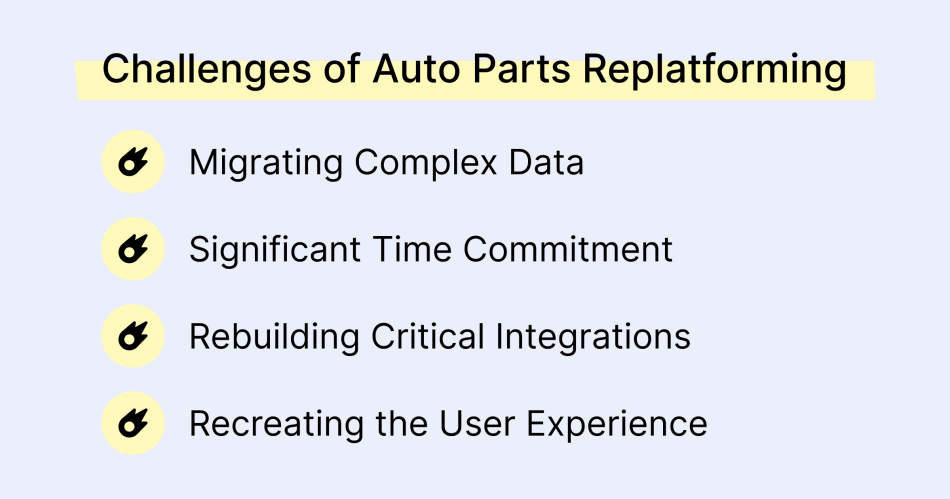
1. eCommerce Migration of Complex Data
Moving SKUs and product images is standard. For an auto parts store, the real challenge is migrating fitment data (ACES/PIES), interchange numbers, and complex product relationships without errors. This data is the lifeblood of your store, and any mistakes can lead to lost sales and costly returns.
2. Significant Time Commitment
Your business will continue to operate during the migration, but it’s still a good idea to set aside significant time and energy for the move, which can take 3–6 months to complete.
3. Rebuilding Critical Integrations
Reconfiguring add-on apps is one thing; re-establishing connections to your ERP, inventory systems, and crucial industry-specific data feeds like ACES and PIES is another. These integrations are non-negotiable and can be complex to set up on a new platform.
4. Recreating the User Experience
Replatforming means rebuilding your customer-facing tools. For a parts seller, this must include perfecting a user-friendly vehicle lookup tool, ensuring search results are fast and accurate, and making sure part diagrams and technical specs are displayed clearly.
Beyond these points, you risk losing valuable SEO rankings for specific part numbers or vehicle models. Our team will make sure your SEO equity is protected throughout the migration.
So, how do you make sure none of these become blockers on the way to success? Let’s see what steps you can take for effective replatforming.
eCommerce Replatforming Checklist: 7 Steps
While challenging, a strategic approach can help your auto parts business avoid pitfalls and stay on track.
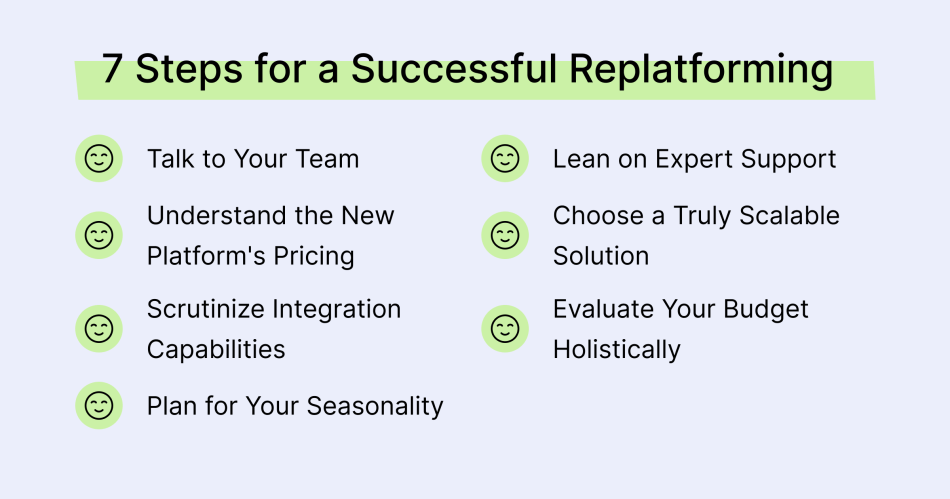
I. Talk to Your Team
Audit your existing systems with the people who use them every day. Ask your customer service, warehouse, and marketing teams about their pain points. Is the issue truly the platform, or is it a broken process? Get a complete picture before making a decision.
II. Understand the New Platform’s Pricing
Look beyond the sticker price. How does the platform bill for high SKU counts? Are there extra fees for API calls used by your fitment search? Will you have to buy expensive apps for basic auto parts functionality?
III. Plan for Your Seasonality
Allow plenty of time (3-6 months) and schedule the transition during your slow season. For many parts stores, this is outside of peak repair seasons like early winter or late spring, but it will depend on your specific customer base (e.g., DIY vs. professional mechanics).
IV. Scrutinize Integration Capabilities
Your platform must connect to your entire business ecosystem. Confirm it can integrate seamlessly with your ERP, inventory systems, shipping providers, and, most importantly, your ACES and PIES data provider.
V. Choose a Truly Scalable Solution
Your business will add new models, years, and product lines. A platform that handles 500,000 SKUs today might crumble at 5 million. Choose a platform architected for the massive scale inherent to the auto parts industry.
VI. Lean on Expert Support
Do not attempt a complex auto parts migration alone. Ensure your new platform vendor provides expert support for migrating fitment data, preserving SEO, and testing your year-make-model lookup functionality.
VII. Evaluate Your Budget Holistically
Consider the total cost of ownership. A cheaper platform that requires expensive custom development for a fitment tool may cost more in the long run than a platform with those features built in or readily available.
What to Ask a Vendor When Selling Auto Parts
When vetting a new platform, ask pointed questions that address the unique needs of your industry.
- Is it truly scalable? Ask directly: “How does your platform architecture handle databases with over 10 million SKUs? Can your API handle thousands of simultaneous fitment queries without slowing down?”
- How deep does customization go? Ask about specifics: “Can we build a custom, multi-step vehicle lookup on the homepage and customize the search results page to show ‘Confirmed Fit’ badges?”
- What does your support look like for our industry? Ask scenario-based questions: “Have you ever managed a migration of a large ACES/PIES database? What is the process if a data import fails?”
- Show me your integration capabilities. Don’t accept a simple “yes.” Ask: “Can you provide case studies or references from other auto parts stores using your platform? Can we see a demo of your ACES/PIES integration in action?”
Why X-Cart for Auto Parts eCommerce Sites?
With two decades of experience, X-Cart is a leader in eCommerce, powering thousands of brands, including many in the auto parts industry.
Highly Customizable
Build your store to your exact specifications. Create the multi-step vehicle fitment lookup your customers need and leverage our extensive app marketplace for any feature you can imagine.
Secure & Reliable
X-Cart is PCI Level 1 certified through X-Payments and includes HTTPS/SSL support, two-factor authentication, and a robust architecture to keep your store running smoothly.
Purpose-Built for Integrations
Our powerful API and pre-built add-ons allow for seamless integration with financials, ERPs, marketplaces like Amazon and eBay, and crucial auto parts data providers for ACES and PIES.
Affordable at Scale
X-Cart offers a powerful solution with transparent pricing designed for growth. We don’t penalize you for the large SKU counts and complex data requirements of the auto parts industry.
Expert Support for Your Migration & Beyond
Get expert support 24/7. Our team has direct experience migrating complex auto parts stores. We will manage the technical details of moving your fitment database and preserving your SEO so you can focus on running your business.
We are here to help you grow your auto parts business.
eCommerce Replatforming FAQs
What is eCommerce replatforming?
eCommerce replatforming is the process of moving an online store from its current eCommerce platform to a new one. This is often done when a business’s current solution can no longer meet its business needs or support its future growth.
The goal is to find the right platform that provides a more robust platform with new features, accomplish a successful migration process, and improve online sales.
What is an example of replatforming?
An example of eCommerce replatforming would be an auto parts retailer moving from a basic, generic platform to a new online store that can handle the complex challenges of their industry. The new online store would be built on a more robust platform that can manage millions of SKUs, complex fitment data, and provide a seamless experience for existing customers.
A successful migration in this scenario involves carefully moving all store data, including valuable data about products and customers, to the new platform while ensuring no disruption to ongoing online sales.
Looking for a new, automotive-first eCommerce platform?
About the author



